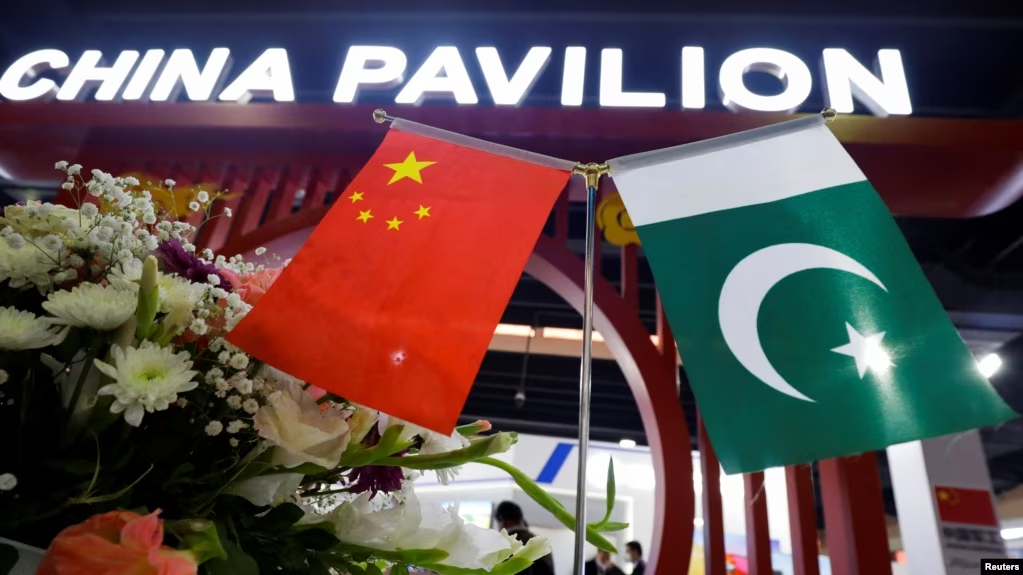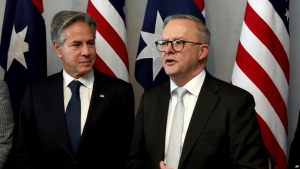A senior White House national security official has said the United States does not want to coerce Pakistan into choosing between Washington and Beijing.

Eileen Laubacher, senior director for South Asia on the U.S. National Security Council, told VOA that Washington wants its partners to be able to choose their relationships freely. The council advises the U.S. president on national security and foreign policy.
“It’s important to reiterate that the United States wants our partners to be able to make their own choices, free of external coercion,” Laubacher said in written comments following her maiden visit to Pakistan this month.
During the July 19-21 visit, Laubacher met with senior Pakistani government and military officials.
“Every country needs productive, supportive, equitable relationships with a variety of partners, and Pakistan is no different,” she said.
The growing rivalry between Washington and Beijing has created a challenge for Islamabad as the United States deepens defense and security ties with Pakistan’s archival India in a bid to counter China’s growing influence.
“Our bilateral relationships with both Pakistan and India do not come at the expense of the other,” the White House official said, repeating a stance frequently expressed by the State Department.
As Islamabad watches India-U.S. ties grow, it hopes to repair its own tenuous relations with Washington, damaged by the 20-year U.S.-led war in Afghanistan that saw the return of the Taliban to power in Kabul.
While Pakistan denies the accusation that it covertly supported the then-insurgent group despite being a U.S. ally in the war, both Washington and Islamabad share concerns over Afghanistan again becoming a terrorist haven under the Taliban.
Laubacher’s visit came amid a flurry of recent high-profile contacts between the two sides, including a telephone call between Secretary of State Antony Blinken and Pakistani counterpart Bilawal Bhutto-Zardari, and a meeting between the U.S. CENTCOM chief Gen. Michael E. Kurilla and Pakistani army chief Gen. Asim Munir in Islamabad.
Responding to whether the U.S. is helping Pakistan target anti-Pakistan terrorists inside Afghanistan, Laubacher said, “We have a close working relationship with Pakistan on security matters.”
Pakistan faces almost daily attacks from Tehreek-e-Taliban Pakistan or TTP, an ideological offshoot of the Afghan Taliban that Islamabad alleges is operating from Afghanistan. The Afghan Taliban deny harboring the TTP.
The U.S. national security official said Washington was providing millions of dollars in life-saving equipment for Pakistani law-enforcement officers upon Pakistan’s request.
This month the U.S. ambassador in Pakistan inaugurated a $17.2 million police training center in Khyber Pakhtunkhwa province that borders Afghanistan and is most affected by terror attacks.
The White House, however, has yet to resume military aid to Pakistan, which then-President Trump froze in 2018 after accusing Pakistan of being untrustworthy in a tweet.
Laubacher did not say if the Biden White House is looking to resume that assistance soon.
“We continue to consider defense transfers and security assistance to Pakistan—as we do with all recipients—on a case-by-case basis, where it serves the interests of both countries.”
Last September, the White House approved a $450 million deal to provide repair and maintenance services for Pakistan’s F-16 fighter jet fleet.
Pakistan has been plagued with political instability since Imran Khan was ousted as prime minister in April of last year. Although Prime Minister Shehbaz Sharif has pledged to pave the way for general elections, uncertainty looms about when and if polls will happen this year.
Responding to a question on how the White House can ensure Pakistan holds timely elections, Laubacher said the U.S. supports free, fair, and credible elections around the world.
“We encourage the government of Pakistan to adhere to Pakistan’s constitution and laws, including with regard to holding general elections,” she said.

